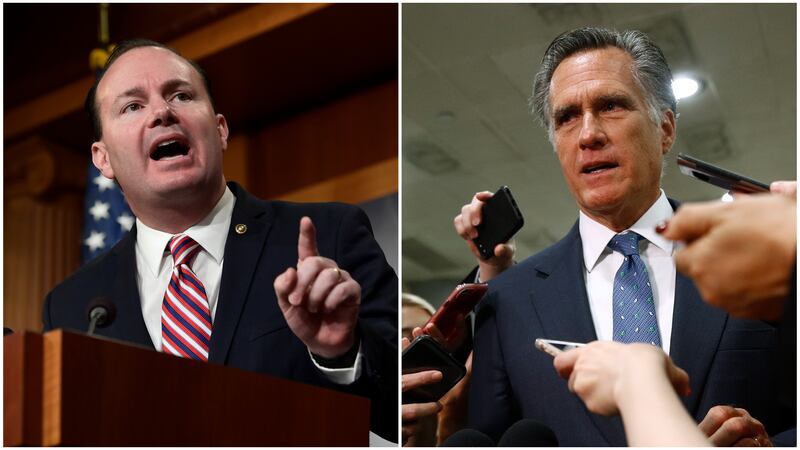SALT LAKE CITY — Calls for remote voting in Congress have increased along with the number of House and Senate members forced to self-quarantine by the coronavirus pandemic. But a new report commissioned by House Democratic leadership gave a thumbs-down to proposals that would let absentees vote from their isolated quarters.
The report came on the eve of an anticipated Senate vote on a $2 trillion emergency aid package, while five senators and up to 30 House members are scattered around the country self-quarantining against the spread of the coronavirus. (A deal on the aid package was reached late Tuesday.)
Among those unable to cast their votes on the historical aid package are both of Utah’s senators — Republicans Mike Lee and Mitt Romney — and the state’s lone Democrat in the House, Rep. Ben McAdams. No other state’s delegation has been hit as hard by the coronavirus outbreak.
Romney and Lee told the Deseret News they support remote voting.
But the report released late Monday concludes that allowing members of Congress to vote remotely rather than in person would create “serious” cybersecurity, logistical and legal problems if quickly implemented in the midst of a global health crisis.
Because the practice is untested constitutionally and there is no precedent for its use in Congress, laws passed under the process could be “challenged in court, for example by an outside group opposing the legislation,” the report states.
The 23-page report by the Democratic staff for the House Rules Committee focused on whether remote voting could be pulled off in the House, but all of the major concerns researchers outlined could also apply to the Senate, according to McClatchy News Service.
While the report aligns with the views of top Democratic and Republican leadership in the House and Senate, members in both chambers have introduced legislation that would allow for remote voting, while a growing number of representatives, senators and outside groups are voicing support for a change.
“Given the scope and uncertainty of the novel coronavirus, Congress should put in place emergency procedures to conduct business,” The Washington Post editorialized Monday, citing past precedents to allow the work of Congress to continue in an emergency. “Instead of finding an alternate or more secure location for members to meet, as during the Atomic Age, the new imperative is to keep people apart to stop the spread of the coronavirus, which means allowing lawmakers to vote remotely.”
But the report said acting too quickly could cause more problems than it solves.
“A rule change of this magnitude would also be one of the biggest rule changes in the last century, in one of the most critical institutions in our country,” the report states. “It would require major changes to foundational House rules surrounding deliberation, voting, and attendance, which would almost certainly cause unintended consequences if not done with adequate forethought and discussion.”
The idea of remote voting isn’t new. One of the House bills — the MOBILE Act — has been introduced by Rep. Eric Swalwell, D-Calif., during every Congress since he was sworn into office in 2013, McClatchy noted.
A resolution sponsored by Senate Minority Whip Dick Durbin, D-Ill., and Sen. Rob Portman, R-Ohio, would require Senate leaders to agree on designating a 30-day window in which members could vote remotely under extraordinary circumstances.
California Democratic Rep. Katie Porter complained that congressional leaders had ignored the inevitable — that the coronavirus would infect lawmakers.
“Eleven days ago, I called on House leaders of both parties to adopt remote voting. They refused to even discuss it,” Porter said in a statement to McClatchy. “While I’m gratified to see bicameral, bipartisan support is growing, the truth [is] that the correct time to adopt remote voting was when the House was last in session.”
The report’s authors agreed that the idea shouldn’t be abandoned. “It may be prudent to consider the feasibility of remote voting for certain emergency situations, but that decision should be a multi-committee effort with substantial study and development.”
They encouraged lawmakers to find other ways of allowing members to cast their votes or register intentions under existing rules.
Among the existing methods under current rules is voting by proxy, which allows an absent member to designate a present member to cast an actual vote for them. The Senate allows proxy voting in committees.
Another scenario that Congress used during the 1918 influenza pandemic, according to the report, would be getting unanimous consent to pass legislation without a quorum. That would allow a chamber to vote on critical bills without a full cohort physically present on the floor, so long as no members object. Unanimous consent is typically used to bypass procedures for minor or noncontroversial issues, unlike the huge emergency spending bills that have ignited partisan rancor.
Leadership needs to decide how to manage voting as the outbreak inevitably pares down membership and threatens to alter control in either chamber, particularly the Senate, where Republicans hold a slim 53-47 majority.
“You can imagine a circumstance where one party actually gets a majority because the other party is more affected,” Daniel Hemel, a professor at the University of Chicago School of Law and proponent of remote voting, told FiveThirtyEight. Hemel said that could create concerns about the long-term legitimacy of votes taken in such circumstances.


